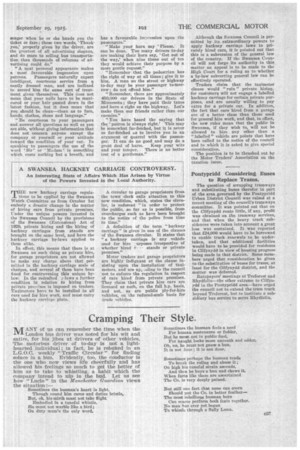A SWANSEA HACKNEY CARRIAGE CONTROVERSY.
Page 21

If you've noticed an error in this article please click here to report it so we can fix it.
An Interesting State of Affairs Which Has Arisen by Virtue of the Powers Invested in the Local Authority.
MLLE new hackney carriage regula tions to be applied by the Swansea Watch Committee as from October 1st embody a drastic change in the matter of hiring cars from private premises, Ender the unique powers invested in the Swansea Council by the provisions of the Swansea (Extensions) Act of 1920, private hiring and the hiring of hackney carriages from stands are brought on the same level, and have the hackney carriage by-laws applied to them alike.
In effect, this means that there is at Swansea no such thing as private hire, for garage proprietors are not allowed to make any charge above that permitted in the hackney carriage scale of charges, and several of them have been fined for contravening this unique bylaw. In the redrafted y-laws a further condition in relation to hiring from private premises is imposed on traders. Taximeters have to be installed in all cars used for hire work, and must carry the hackney carriage plate.
A circular to garage proprietors from the townclerk calls attention to this new condition, which, states the circular, is enforced "in order to protect the public, so far as is possible, from overcharges such as have been brought to the notice of the police from time to time."
A definition of the term "hackney carriage" is given in one of the clauses of the Swansea circular. It states that "a hackney carriage is any vehicle used for hire urposes irrespective of whether hired f-stands or private premises."
Motor traders and garage proprietors are highly indignant at the clause insisting upon the installation of taximeters, and are ap.3aing to the council not to enforce the regulation in respect of cars hired from private premises. They claim that private hire cars are licensed as such, on the full h.p. basis, and not, as are public ply-for-hire vehicles, on the reduced-scale basis for trade vehicles.
Although the Swansea Council is permitted by its extraordinary powers to apply hackney carriage laws to privately hired ears, it is pointed out that this is a subversion of the general law of the country. If the Swansea Council will not forgo its authority in this matter an appeal is to be made to the High Court for a ruling as to whether a by-law subverting general law can be effectively operated.
Traders claim that the taximeter clause would " ruin " private hiring, for customers will not engage a labelled hackney carriage for certain private purposes, and are usually willing to pay extra for a private car. In addition, the fact that cars hired from a garage are of a better class than those used for general hire work, and that, in effect, the new rules mean that the public in Swansea, if they wish to, will not be allowed to hire any other than a "labelled" vehicle are points that have been called to the notice of the council and to which it is asked to give special consideration.
The position is to be thrashed out by the Motor Traders' Association on the taxation issue.
Pontypridd Considering Buses to Replace Trams.
The question of scrapping tramways and substituting buses therefor in part of the area governed by the Pontypridd Urban District Council was raised at a recent meeting of the council's tramways committee. It was pointed out that on the Cilfynydd route little, if any, profit was obtained on the tramway services, and that when the heavy track subsidences were taken into account a great loss was sustained. It was reported that £24,000 would have to be borrowed to enable track renewals to be undertaken, and that additional facilities would have to be provided for residents in Clifynydd in view of housing progress being made in that district. Some members urged that consideration be given to the substitution of buses for trams, at least for the Cilfynydd district, and the matter was deferred.
Ratepayers' meetings at Treforest and Rhydfelin—the other extreme to Cilfynydd in the Pontypridd area—have urged the council not to extend the tram track beyond Treforest, but to institute a subsidiary bus service to serve Rhydfelin.






























